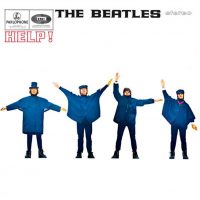
30 March; 13 April 1965
10 May 1965
14, 15, 17 June 1965
Producer: George Martin
Engineer: Norman Smith
Released: 6 August 1965 (UK), 13 August 1965 (US)
Personnel
John Lennon: vocals, electric guitar, acoustic guitar, 12-string acoustic guitar, electric piano, Hammond organ, tambourine, snare drum
Paul McCartney: vocals, electric guitar, acoustic guitar, bass guitar, piano, electric piano
George Harrison: vocals, electric guitar, acoustic guitar, 12-string acoustic guitar, güiro
Ringo Starr: vocals, drums, tambourine, maracas, cowbell, bongos, claves, percussion, handclaps, acoustic guitar percussion
George Martin: piano
Johnnie Scott: tenor flute, alto flute
Tony Gilbert: violin
Sidney Sax: violin
Kenneth Essex: viola
Francisco Gabarro: cello
Tracklisting
‘Help!’
‘The Night Before’
‘You’ve Got To Hide Your Love Away’
‘I Need You’
‘Another Girl’
‘You’re Going To Lose That Girl’
‘Ticket To Ride’
‘Act Naturally’
‘It’s Only Love’
‘You Like Me Too Much’
‘Tell Me What You See’
‘I’ve Just Seen A Face’
‘Yesterday’
‘Dizzy Miss Lizzy’
The Beatles’ fifth official UK album release, Help! was the soundtrack to the group’s second feature film. It contained 14 songs: 10 by John Lennon and Paul McCartney, two more by George Harrison, and a further two cover versions.
The film had an early working title of Beatles II, until Eight Arms To Hold You was suggested. This was used for around three weeks in March and April 1965, and Capitol Records even announced that it would be the title of their first US single of the year.
Eventually the title Help! was settled on and, as for A Hard Day’s Night previously, John Lennon rose to the challenge of composing the theme song.
Lennon’s writing for the Help! LP continued the inward reflection first explored on Beatles For Sale, with the title track speaking of his insecurity during the peak of The Beatles’ fame.
The whole Beatle thing was just beyond comprehension. I was eating and drinking like a pig and I was fat as a pig, dissatisfied with myself, and subconsciously I was crying for help…When ‘Help!’ came out, I was actually crying out for help. Most people think it’s just a fast rock ‘n’ roll song. I didn’t realise it at the time; I just wrote the song because I was commissioned to write it for the movie. But later, I knew I really was crying out for help. So it was my fat Elvis period. You see the movie: he – I – is very fat, very insecure, and he’s completely lost himself. And I am singing about when I was so much younger and all the rest, looking back at how easy it was.
All We Are Saying, David Sheff
Lennon’s other key compositions for the album were ‘Ticket To Ride’, which became The Beatles’ first single of 1965, and ‘You’ve Got To Hide Your Love Away’, a mostly acoustic recording featuring introspective lyrics inspired by Bob Dylan.
I was in Kenwood and I would just be songwriting. The period would be for songwriting and so every day I would attempt to write a song, and it’s one of those that you sort of sing a bit sadly to yourself, ‘Here I stand, head in hand…’I started thinking about my own emotions – I don’t know when exactly it started, like ‘I’m A Loser’ or ‘Hide Your Love Away’ or those kind of things – instead of projecting myself into a situation. I would try to express what I felt about myself which I’d done in me books. I think it was Dylan helped me realise that – not by any discussion or anything but just by hearing his work – I had a sort of professional songwriter’s attitude to writing pop songs; he would turn out a certain style of song for a single and we would do a certain style of thing for this and the other thing. I was already a stylized songwriter on the first album. But to express myself I would write Spaniard In The Works or In His Own Write, the personal stories which were expressive of my personal emotions. I’d have a separate songwriting John Lennon who wrote songs for the sort of meat market, and I didn’t consider them – the lyrics or anything – to have any depth at all. They were just a joke. Then I started being me about the songs, not writing them objectively, but subjectively.
Lennon Remembers, Jann S Wenner
Cover artwork
The front and rear photography for Help! was taken by Robert Freeman, who had previously worked with the group on With The Beatles, A Hard Day’s Night, and Beatles For Sale.
The front cover was yet another instantly classic design. Featuring the four Beatles standing in a row wearing their ski garb from the Help! film, they spelt out the letters ‘NUJV’ in semaphore. For the US version released by Capitol Records, the order was slightly amended to read ‘NVUJ’.
I had the idea of semaphore spelling out the letters HELP. But when we came to do the shot the arrangement of the arms with those letters didn’t look good. So we decided to improvise and ended up with the best graphic positioning of the arms.


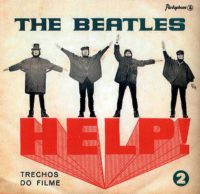
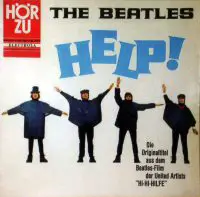
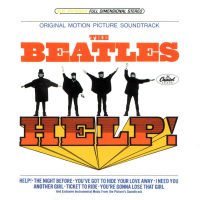
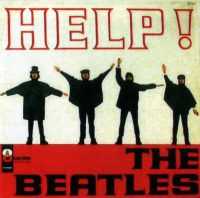
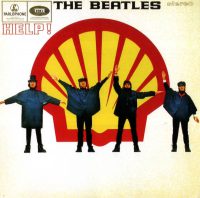
‘Help’ is a very “overlooked” Beatles album because its half Beatlemania and half “new” Beatles. While there are some great old-style Beatles songs on it, Beatlemania ends on this album…and ‘Rubber Soul’ begins. You get the best of both worlds on ‘Help’. Also, McCartney emerges as a strong song writer on this album for the first time…equal with Lennon. Previously, Lennon was the dominant singer/songwriter. This is probably why the next few years produced some of their finest music. Can’t forget Harrison. He also emerges as a strong song writer on ‘Help’ and continues on throughout his Beatle career.
‘Help’, ‘The Night Before’, ‘You’re Gonna Lose That Girl’, Yesterday’ ‘ Another Girl’…good Beatlemania-style songs.
Then, the “new” Beatles emerge with “I’ve Just Seen A Face”, ‘You’ve Got To Hide Your Love Away’, ‘It’s Only Love’, ‘Ticket To Ride’…ushering the “Rubber Soul/Revolver” period…and a great Harrison tune, ‘I Need You’.
You are perpetuating the nonsense you claim to despise. McCartney was always a great song writer and contributed massively to all the albums. Take a Hard Days Night, he wrote Can’t buy me Love, Things we Said Today and And I Love Her. Every one a classic.
Yesterday, a beatlemania-style song? I actually think that Mccartney does not really arrive as songwriter until Revolver, with the exception of Yesterday. It is interesting that he becomes so prolific and dominating in 1967 but all of the songs that really give the beatles depth and soul belong to John although Paul contributes a lot to John songs. Probably more than John contributed to Paul’s. The masterpieces of 67 include: Strawberry Fields, Mr. Kite,Lucy in the sky w/ Diamonds, Day in the life, I am the Walrus, All you need is love. The only 67 Paul song that is of this caliber is Penny Lane. If you take John’s contribution off of Pepper and George’s Within you and Without you it is a rather light weight record. Don’t get me wrong, I love Paul but John really gets depicted badly in Emmerick’s book. After reading it, you would think that old Geoff fancied Paul.
Emmerick has worked for Paul on 3 albums after the breakup. He is not a source of objectivity.
Neither of you guys seems to know what you are talking about. 1) The idea that the Beatles wrote “Beatlemania” songs until a certain point and then suddenly changed it with Rubber Soul/Revolver is nonsense. The hallmark of Lennon-McCartney songwriting was they insisted on writing something new and different from any previous song, exploring new musical territory. Beatlemania was not a song writing genre, but something the press made up to describe fan reaction. Beatlemania “ended” when they decided to stop touring, period. Not only were they tired of it, but reproducing their increasing complex songs (like Rain/Paperback Writer) on stage was difficult and frustrating.
2) Lennon and McCartney were in fact largely equal co-writers on many of the early songs (From Me To You, She Loves You, I Wanna Hold Your Hand, This Boy, etc.), with McCartney early on revealing a special talent for creating memorable melodies (something Lennon tended to struggle with, especially in later years.) Lennon was a great lyricist and straight rock and roller, and it should be pointed out their first two albums featured lots of rock and roll covers, plus a few great original compositions. Writing-wise, I Saw Her Standing There was largely Paul, as was Love Me Do. All My Loving was all Paul. By A Hard Day’s Night some truly timeless standouts were being written by Paul (And I Love Her, Can’t Buy Me Love, Things We Said Today.) The songs A Hard Day’s Night and I’m Happy Just To Dance With You were co-written, while You Can’t Do That was a classic Lennon rocker (and a personal favorite of mine.) McCartney likewise made considerable contributions to Help. Even excluding Paul’s unmatched Yesterday, McCartney songs like The Night Before are quite notable, as well as his distinctive co-writing on Ticket To Ride (including the unique drum syncopations which were all Paul.)
So, the ridiculous notion that McCartney didn’t come into his own as a songwriter until Revolver or later is simply misguided fantasy with no basis in fact. Even sillier is the assertion Lennon wrote any/all songs of substance in 1967. Nonsense. Hello Goodbye, yep, B side to Walrus A, went to No. 1 while Walrus tanked (guess the public knew best on that one.) Then there was Fool On The Hill, a remarkably beautiful song Paul composed while at the same time co-writing A Little Help From My Friends with Lennon. Then of course was Sgt. Pepper, a classic rocker featuring one of McCartney’s best vocals ever (plus his lead on guitar.) Not to mention there would be no Day in the Life had not McCartney provided the incredibly symphonic musical depth for the song’s middle. Then again, Lennon later dissed much of his own work on Pepper, saying how dissatisfied he was with it and would like to do it over. I don’t happen to agree, I think Lennon’s Pepper contributions were oustanding. Lennon though could get fairly petty not only about Paul’s work but everything Beatles, which apparently still translates over to some fans who never weary of this silly pissing match…
You prefer Hello Goodbye to I am the Walrus? Enough said, no reason to continue having this conversation.
I prefer reading comments by people who actually know something and don’t just make stuff up while ignoring facts (like calling Ringo “clumsy.”) Early on McCartney and Lennon were equal songwriters. That’s why they were a songwriting “team.” Though different in applied talents, one was not more dominant then the other.
OK, can I request that you all play nicely? There’s room for opinions without it getting personal, so let’s try to keep this a pleasant place to discuss the songs.
George once said that Ringo’s fills sounded like someone falling down the stairs.
Where’s your source?
Actually Abe Laboriel Jr. said something very similar to that at the time when Ringo
Was inducted into the Rock’n’Roll Hall of Fame.
He probably meant it in a good way as a reference to Ringo having his own unique drumming style and approach to drum fills, never playing the same thing twice.
WOW! I never thought an observing commentary on the “Help” album could bring such anger from a McCartneyologist. While it’s true that McCartney made Lennon a better songwriter, the same can be said for Lennon for McCartney. However, what I said was a personal opinion that I think the “Help” album was the Beatles saying goodbye to Beatlemania and introducing themselves to the “Rubber Soul” era. Half of “Help” was Beatlemania, the other half was more mature, laid back, more acoustic and McCartney offered us more. I have to take the word of McCartney that he and Lennon wrote eyeball to eyeball (as Lennon also said), but that whoever was the primary writer…sang the song. No doubt also that if the Beatles were made up of only Lennon’s songs, then we’d be bored quickly…vice versa with only McCartney’s songs, if they had no influence on one another. So come on Thomas, lighten up and open up to other opinions…but thanks for the critique and you have some valid points.
I have to disagree with you on Help! being their transitional album. There are still some lingering elements of their earlier years, but in my book the transition really began with the moody Beatles For Sale. As I said over on the comments for No Reply:
So while Help! is definitely transitioning, I think it had already begun an album earlier. I’d even accept an argument that it started with A Hard Day’s Night, but for me that’s pushing it a bit.
You are probably right. It was the New York meeting with Bob Dylan that got John on a different “tack” when it came to songwriting. It became much more introspective with “I’m a Loser” and “No Reply,” especially the former.
Being posted on Quora:
Unfortunately, Capitol repackaging sometimes affected the perception of where the Beatles were headed musically, especially noted by me for 1965, where people saw a sharp change of sound after Beatles VI and the Help! soundtrack when Rubber Soul came out. People in the U.S. didn’t know about the non-soundtrack side of the British Help! album:
3 songs already on Beatles VI; 2 other songs, “Yesterday” and “Act Naturally”, were the next U.S single but weren’t on album until 1966 Yesterday and Today; 2 other songs, not officially released in U.S. until Rubber Soul, where they led off sides 1 & 2.
The Beatles understood they were to record 2 songs in May 1965 for the U.S. market. They responded with Dizzy Miss Lizzie and Bad Boy; those were used on Beatles VI, then Dizzy Miss Lizzie was used on British Help! album. Bad Boy was unreleased in UK until Beatles oldies album there in late 1966. Along with “Act Naturally”, they were the last cover songs recorded by the Beatles until excerpt of Maggie Mae on Let It Be.
Brian Wilson cited Rubber Soul as a big influence on Pet Sounds, and I pressed the question of which Rubber Soul, because of differences between Capitol and Parlophone labels. Controversy would sometimes ensue when a record leaked to the other side of the Atlantic and was found to have songs not released on that other side of the Atlantic. Jan. 1965 saw the release of a Capitol single whose 2 songs were on a British album the preceding month but not on US album released that same month; this happened again in Jan. 1966.
Your comment really strikes a chord with me Carl. I think for those of us who are old enough to have been listening to these albums at the time they came out, the repackaging of the material by Capitol, (which most of us teenagers and pre-teens were completely unaware of at the time), has really influenced how we view them. For years I thought of the American version of Rubber Soul as the ultimate masterpiece of folk rock and acoustic pop. When I finally heard the album in its original form, (when the band’s catalog was released on CD in 1987), it was a shock. I had always loved “Drive My Car”, but as the opening number on this album? Instead of “I’ve Just Seen a Face”? No way! And when “Nowhere Man” interrupts the wonderful flow of the first side, well, that was jarring to hear. I know in my mind that this is the way the band actually released the album and intended for it to sound, but it still feels wrong to me, even nearly 40 years later.
“I actually think that McCartney does not really arrive as songwriter until Revolver, with the exception of “Yesterday”? And that John Lennon Dominating until 1967, That is Ridiculous!
For example, “Michelle” – Written by Paul McCartney in 1965. It won a Grammy for song of the year in 1967. And it was an #1 hit in Belgium, Finland, France, Italy, The Netherlands, New Zealand, Norway and Sweden. And “Michelle” won the Ivor Novello Award in 1967 for ” The Most Performed Work” of 1966.
“Yesterday” – Written by Paul McCartney in 1965. Is one of the most recorded Songs in the History of popular music. It made into the Guinness Book of Records, by 1986 over 1,600 Covers had been done. And “Yesterday” won the Ivor Novello Award for “Outstanding Song” in 1965. In 1966, the song “Yesterday” was nominated for the Grammys for Song of the Year. In 1997, the song was inducted into the Grammy Hall of Fame. “Yesterday” was voted Best Song of the 20th Century in a 1999 BBC Radio 2poll. Rolling Stone – The 500 Greatest Songs of All time in 2004, list “Yesterday” as #13. Chuck Berry said that “Yesterday” was the song that he wished he had written.
And “Love Me Do” – Written by McCartney was their first single of The Beatles in October 1962. And it was their first #17 hit in the UK and it made to #1 in America in 1964 and in 2 other Countries.
“From Me To You” – Co-written, “She Loves You” – Co-written, “I Want to Hold Your Hand” – Co-written, “Can’t Buy Me Love” – Written by Paul McCartney, “Eight Days a Week” – Co-written, “Yesterday” – Written by Paul McCartney, “We Can Work it Out” – Written by Paul McCartney, “Paperback” – Written by Paul McCartney, “Yellow Submarine” – Written by Paul McCartney and “Eleanor Rigby” – Written by Paul McCartney was #1 hit in the UK or the USA or Both before 1967.
And “I Saw Her Standing There” – Written by McCartney, “All My Loving” – Written by Paul McCartney and “She a Woman”were #1 hits in other Countries.
“But to all the songs that really give The Beatles depth and soul belong to John”? It So, Ridiculous! Included – “Strawberry Fields”, “Mr. Kite” (Words off of a poster), “Lucy in the Sky with Diamonds”, “A Day in the Life” (Co-written), “I am the Walrus”, “All You Need is Love”.
Paul McCartney has soul and depth and beautiful lyrics! “Blackbird” (Civil Rights), “Eleanor Rigby”, “For No One”, “Here, There and Everywhere”, “Hey Jude”, “Yesterday”, “Penny Lane”, “We Can Work It Out”, “She Is leaving Home” and “Let It Be”, Etc….
This is their second weakest album (their first is their worst in my book). Don’t get me wrong, ‘weak’ for the Beatles is still fantastic. But their are only 5 standout tunes on this album. The rest are good, but not fantastic. The sound is very muddy, not crisp at all compared to their other albums. It works on “You’ve got to..” but not on the rest.And the performances are less enthusiastic than any other album, except for possible Let it Be.
To me, there is a lot of “filler” songs on this album. Mostly McCartney tunes. But they (the songs) blend in well and follow along quite well. I came across a German pressing lp at a flea market (rummage sale) here in Pensacola, Florida last year. the cover was torn but the vinyl was in great shape. I wish I would have bought it!
Thomas lets be fair, You make a comment like ” Obviously You all don’t know what Your talking about ” People have certain opinions and I respect that, You seem pretty McCartney biased from the long piece You wrote. I guess Im more Lennon biased as He’s my idol and I get that aswell. McCartney is a genius musician that there is no doubt, But I feel in the early days leading up to Revolver, Lennon was the main man he was the one who wrote the better songs, He had the drive which spurred the Beatles on, Look at A Hard Day’s Night for example its basically a Lennon solo album, He was so creative in those early Beatle’s days and yes Lennon was more the rocker of the two and he wrote the more edgier/zingy Beatles tracks but he also had that sensitive side to Him look at Julia, Across The Universe for example, The thing with McCartney was he was too mainstream he wanted to release safe tracks that He knew would be accepted, Lennon was the opposite he was writing songs and searching for a new direction and in the process laying down the foundations for music as We know it now. Both equally brilliant in there own right, Alone they were good, Together they were Stellar! Its just John is My favourite…
By the way HelloGoodbye is a great track, I Am The Walrus is frighteningly brilliant…
I noticed on the US cover that George is standing on the H for Harrison, John on the L for Lennon, and by his first name Paul on the P, but none for ringo, especially because he doesn’t have any of the titles letters in his stage name. Sounds silly, but i like to think that.
polishrocker93: I transferred your remark to wikipedia talk page about this album.
As for the British cover, I noticed the Beatles are in alphabetical order, and this is either by first or last name! For Paul, ignore the “James” (you may remember “James Paul McCartney”).
I agree with whoever said that there are five great songs on this album. If you took Help, Hide Your Love Away, Ticket to Ride, I’ve Just Seen a Face and Yesterday they match up with anything the Beatles ever did. The problem is there are too many fillers after that, although most are pretty decent. I can’t stand You Like Me Too Much though, the lyrics are juvenile, and Tell Me What You See and Dizzy Miss Lizzy are average at best. As for the Lennon/McCartney debate, this was really the start of Lennon’s peak, he was just incredible in ’65, whereas I don’t think Paul peaked until about ’68 with his fantastic contributions to the White Album and also Hey Jude. Although maybe he peaked on Revolver, but I’ve always liked his White Album songs better.
“The front cover was yet another instantly classic design. Featuring the four Beatles standing in a row wearing their ski garb from the Help! film, they spelt out the letters ‘NUJV’ in semaphore. For the US version released by Capitol Records, the order was slightly amended to read ‘NVUJ'” WHY?
I believe Ringo was moved to the left and John and Paul moved to the right so that Paul’s hand would point to the “Capitol” logo.
Although I like the Polish poster’s reply below that the American cover puts Harrison above the H, Lennon above the L, and Paul above the P. Poor Ringo gets the E, or a punctuation mark on other albums.
This was maybe the first British import LP I bought (I’m in the US) and I loved the A side–the movie music. I rarely played the B side even though it had a few stellar cuts (I’ve Just Seen A Face, Yesterday) because the weak songs are pretty darn weak.
Loved the movie too. A little aimless perhaps, but very funny. (“Are you buzzing?”)
It’s definitely not much of a Beatles film, but it is a very fun spy movie pastiche that happens to have the Beatles in it.
Side one is good, side two seems fairly forgettable though, excluding Yesterday of course. The organ playing helps on some of the tracks. Played by John I believe.
As a kid in the mid 60’s and bought a 45 rpm copy of “Ticket to ride” that says on it: “from the United Artists release Eight arms to hold you”. I didn’t think much of of it at the time, but now I’m glad I have it. It’s probably not worth much, not quite like an original “Butcher” LP cover, but it is neat to have one of those “Mistakes”. The US version of the Help LP is a rough listen. I am not much of an instrumental fan. Always thought it was filler and fluff that I really didn’t want to pay for. The UK version is stellar.
I got this album in March 1980 for my 14th birthday. Like its predecessor Beatles For Sale it is a transitional album, as Beatles biographer Bob Spitz said in 2005. I believe because of that it is also underrated. The song Help is a John Lennon autobiographical song and Youve Got To Hide Youre Love Away is a Lennon classic. Likewise I just love Ticket To Ride, another John Lennon beauty. As for Paul McCartney he came up with one of his all time classics , Yesterday and one of his most underrated Ive Just Seen A Face. I just love Dizzy Miss Lizzy ,a great cover. I do not care what anyone says, like all The Beatles albums this deserves to be listed in the top 100 albums of all time.
I believe this album is underrated because as Beatles biographer Bob Spitz said in 2005 this is a transitional album. I got this in March 1980 for my 14th birthday. It belongs like all the Beatles albums in the top 100 records of all time. John Lennon came up with classics like the title track Help, Youve Got To Hide Youre Love Away and Ticket To Ride. Paul McCartney has one of his greatest , Yesterday and the underrated Ive Just seen A Face. And I just love the cover of Dizzy Miss Lizzie.
This is how I reshuffled Help! on my playlist. Included are If You’ve Got Trouble from anthology, I’m Down, Bad Boy, Yes It Is and Wait from Rubber Soul
(Which was written as a Help! Song). Removed are my two least favorite songs on the album, Act Naturally and I’ve Just Seen A Face.
Side one
1. Help!
2. The Night Before
3. You’ve Got To Hide Your Love Away
4. I Need You
5. Another Girl
6. If You’ve Got Trouble
7. You’re Going To Lose That Girl
8. Wait
9. Ticket To Ride ( side one closer )
Side two
10. Bad Boy
11. I’m Down
12. It’s Only Love
13. You Like Me Too Much
14. Tell Me What You See
15. Yes It Is
16. Yesterday
17. Dizzy Miss Lizzy ( album closer )
Congrats B L-H fan, you should go work for Capitol Records….. ;o)
Help! was the Beatles at their fun loving cheekiest. It is a perfect balance of the optimistic days of 1963 and the downer times of Beatles For Sale, and soon, Rubber Soul / Revolver.
Also one of the last albums with John clearly in command. It’s unfortunate he lost interest in the Beatles by 1966-67 because the time period from Please Please Me to Rubber Soul was the Beatles at their finest, all of these albums, by the way, featured John on lead at least 6 or 7 times if not more. Clearly the Beatles weren’t quite the same by Sgt.Pepper onward.
I thought that was a Pete Townsend quote about Keith Moons drumming ?
Help is the beginning of McCartney castrating Harrison. At this point McCartney took over lead guitar on his songs. No wonder Harrison never forgave McCartney. Mccartney has said Harrison didn’t turn up for many Pepper sessions. Why would Harrison turn up when he had zero input into any of McCartney songs.
Harrison had input on many Mccartney songs, (and vice versa) but Paul occasionally had an idea of the sound he wanted and it wasn’t on the same track with george so George felt left out. Most famously on let it be gorge started with a strong guitar counter to the music and Paul wanted to start with just the piano and add more instruments in so he asked George to stop. You can see why George would be irritated but it was Paul’s song and he called the shots. George did the same on his songs. Paul gave his all on George’s songs so george had fewer chances to irritate paul. Just a case of 2 musical brains getting better all the time and no longer in synch. George was ready to go on his own as were they all. Too bad they could not work it out enough to get back and record an occasional reunion album…
That song was “Hey Jude”, not “Let it Be”.
No it wasn’t and Paul never castrated George. Yes, Paul did play lead guitar on select songs, but he still remained The Beatles’ bassist and George remained The Beatles’ lead guitarist.
I never realized how pretentious and irritating Beatles fans could be until reading the comment sections of this website. You guys need to take it down a notch and stop pretending like you were there in the recording studio.
Naturally, these are my own personal opinions… Although there are some excellent songs on this, as a full “album”, it never really gelled for me. As far as soundtracks are concerned, this is inferior to “A Hard Day’s Night”. As far as studio albums are concerned, I would take “Beatles For Sale” over this. A lot of filler on this album, especially Side 2. It might’ve been better if some B-sides were added (“Yes It Is”, “I’m Down”). Although I can see why they shelved it (partly because of the drum patterns’ similarity to “Ticket To Ride”), I still wish they would’ve completed “That Means A Lot” & included it on this, possibly as the opening track on Side 2.
“Help!” was the beginning of a new era for The Beatles: reduction mixes began to be utilized in recordings (not as prolifically at this stage, compared to later years), Paul began to branch out to playing guitar while still remaining their bassist (remember that he reluctantly switched to the bass after John and George both refused, preferring to stay guitarists), John and Paul both began to contribute more keyboard parts (John on electric piano and organ and Paul on acoustic piano and electric piano), George started writing and singing his own songs again, branched out to 12-string acoustic guitar and started utilizing the volume pedal and Leslie speaker, John gave his harmonica a rest from recording until “Sgt. Pepper”, Ringo played the back of a guitar body on “I Need You” and the group began a new routine of rehearsing a song with the tapes rolling and then record over the rehearsals with the proper performance of whatever song they were recording that day.
Additionally, Johnnie Scott played flutes on “You’ve Got to Hide Your Love Away” (frankly, it made a nice change from the harmonica) and a string quartet was used on “Yesterday”.
This is also the last album where Paul only used his Hofner for playing his bass parts, because he started to use his Rickenbacker for “Rubber Soul”.
Here’s some more trivia: George and John acquired their Fender Stratocasters at the start of the sessions for “Help!”, not “Rubber Soul”, as some sources have erroneously reported. George Martin’s handwritten production notes confirm the utilization of Fender Stratocasters from John and/or George, contingent on the song.
As the story goes, John and George dispatched Mal Evans off to Kent to buy a couple of Fender Stratocasters and Brian Epstein agreed to pay for them on the condition that they were identical. Mal came back from Kent with two Fender Stratocasters in a rare Sonic Blue finish and George’s one was the same guitar that he repainted in psychedelic colours and nicknamed “Rocky”, so he clearly loved that Stratocaster very much.
John also liked his Stratocaster enough to use it on the “Help!”, “Rubber Soul” and perhaps the “Revolver” sessions not to mention that he was photographed with it during the “Sgt. Pepper” sessions, but I don’t know what became of his Stratocaster; still, neither he nor George fully abandoned their Rickenbacker 325 and Gretsch respectively for the “Help!” and “Rubber Soul” sessions.
This was a fun album and movie to me before the psychedelic era. My off beat favorite song was always the less often cited The Night Before as love Macca’s voice on that. However, the other main songs are much stronger. I never even thought of Paul “castrating” George by playing guitar, lol.
The comment of Paul “castrating” George by playing guitar is nonsense and despite what Paul incorrectly stated in a 1980’s interview, George actually was very involved with the “Sgt. Pepper” sessions.
I think that this is by far the most underrated of all the Beatles’ albums. I believe that the main cause of that is it’s association with the very silly and goofy movie of the same name. But if you disassociate it from the film, and remove your visualization of some of the scenes where the songs are performed, and just listen to it as an album of music, it is really a wonderful piece of work. In fact, I believe it is the band’s Great Leap Forward, rather than Rubber Soul, which is usually credited with that accomplishment. To my ear, this album is light years ahead of Beatles For Sale, while Rubber Soul is only slightly better than Help! Don’t get me wrong, Rubber Soul is the more complete and sophisticated album, but not by as much as seems to be the popular perception. The main difference, in my opinion, between the two is that Harrison’s contributions to the latter are much stronger and the inclusion of the two cover songs on this album really don’t fit with the rest of the material. Setting aside those four songs, however, almost everything else on Help! would not seem out of place on Rubber Soul or vice versa. In fact, a number of songs WERE actually swapped between the two. Wait was originally recorded for this album and I’ve Just Seen a Face and It’s Only Love were taken from Help! and added to Rubber Soul for the American release. Would Drive My Car and Norwegian Wood sound that out of place on this album if they were swapped for Help! and You’ve Got To Hide Your Love Away? Likewise, would those latter two songs sound out of place on Rubber Soul? And while Another Girl and Tell Me What You See are a bit more simplistic, catchy pop than anything on Rubber Soul, Help! does contain Yesterday, which is the single most important composition on either album.
I’ve often heard it said, even by several of the band members themselves, that Rubber Soul and Revolver should be viewed as two parts of the same double album. But I believe that those two records, other than the more introspective lyrics, are very different on almost every level. Revolver is much closer to SPLHC in content. No, it is this album, Help!, which is the true companion and precursor to Rubber Soul.